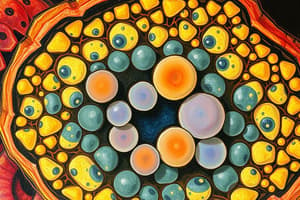Podcast
Questions and Answers
What is the powerhouse of the cell that provides energy?
What is the powerhouse of the cell that provides energy?
- Ribosomes
- Nucleus
- Chloroplast
- Mitochondria (correct)
What is chromatin?
What is chromatin?
Material in cells that contains DNA and carries genetic information.
What is the function of lysosomes?
What is the function of lysosomes?
Involved in the digestive activities of the cell.
What are ribosomes?
What are ribosomes?
What is the role of the nuclear membrane?
What is the role of the nuclear membrane?
What are chloroplasts involved in?
What are chloroplasts involved in?
What does the nucleus do?
What does the nucleus do?
What is a cell wall?
What is a cell wall?
What is the function of the endoplasmic reticulum?
What is the function of the endoplasmic reticulum?
What is the vacuole's purpose?
What is the vacuole's purpose?
What is cytoplasm?
What is cytoplasm?
What is the nucleolus?
What is the nucleolus?
What does the cell membrane do?
What does the cell membrane do?
What is the role of the Golgi body?
What is the role of the Golgi body?
What are vesicles?
What are vesicles?
Who were pioneers in the study of cells?
Who were pioneers in the study of cells?
What are cells?
What are cells?
What is cell theory?
What is cell theory?
What does a histologist study?
What does a histologist study?
Who was Robert Hooke?
Who was Robert Hooke?
Who was Anton van Leeuwenhoek?
Who was Anton van Leeuwenhoek?
What did Matthias Schleiden discover?
What did Matthias Schleiden discover?
What did Theodor Schwann discover?
What did Theodor Schwann discover?
What did Rudolph Virchow discover?
What did Rudolph Virchow discover?
Flashcards
Mitochondria
Mitochondria
Cell organelle that generates energy through cellular respiration.
Chromatin
Chromatin
DNA and proteins in the nucleus; contains genetic material.
Lysosome
Lysosome
Cell organelle that digests waste and cellular debris.
Ribosome
Ribosome
Signup and view all the flashcards
Nuclear Membrane
Nuclear Membrane
Signup and view all the flashcards
Chloroplast
Chloroplast
Signup and view all the flashcards
Nucleus
Nucleus
Signup and view all the flashcards
Cell Wall
Cell Wall
Signup and view all the flashcards
Endoplasmic Reticulum
Endoplasmic Reticulum
Signup and view all the flashcards
Vacuole
Vacuole
Signup and view all the flashcards
Cytoplasm
Cytoplasm
Signup and view all the flashcards
Nucleolus
Nucleolus
Signup and view all the flashcards
Cell Membrane
Cell Membrane
Signup and view all the flashcards
Golgi Body
Golgi Body
Signup and view all the flashcards
Vesicle
Vesicle
Signup and view all the flashcards
Cell Theory
Cell Theory
Signup and view all the flashcards
Robert Hooke
Robert Hooke
Signup and view all the flashcards
Anton van Leeuwenhoek
Anton van Leeuwenhoek
Signup and view all the flashcards
Matthias Schleiden
Matthias Schleiden
Signup and view all the flashcards
Theodor Schwann
Theodor Schwann
Signup and view all the flashcards
Rudolph Virchow
Rudolph Virchow
Signup and view all the flashcards
Study Notes
Cell Structures and Functions
- Mitochondria: Known as the powerhouse of the cell, it generates energy through cellular respiration.
- Chromatin: Contains DNA and genetic information, found in the nucleus.
- Lysosome: A small, round organelle involved in digestion and waste processing within the cell.
- Ribosomes: Sites of protein synthesis, often associated with the endoplasmic reticulum for translation.
- Nuclear Membrane: A protective layer surrounding the nucleus, regulating the entry and exit of materials.
- Chloroplast: Contains chlorophyll and is crucial for photosynthesis in plant cells.
- Nucleus: Functions as the control center of the cell, orchestrating cellular activities.
- Cell Wall: The rigid outer layer of plant cells, primarily made of cellulose for structural support.
- Endoplasmic Reticulum (ER): Network of tubular structures that transport materials within the cell.
- Vacuole: Large storage sac in the cytoplasm for water, nutrients, and waste products.
- Cytoplasm: The aqueous environment filling the cell, located between the membrane and nucleus.
- Nucleolus: A substructure within the nucleus, involved in ribosome production.
Membranes and Transport
- Cell Membrane: A flexible barrier that regulates what enters and leaves the cell through selective permeability.
- Golgi Body: Receives proteins and lipids from the ER, modifies them, and dispatches them to their destinations.
- Vesicle: Small membrane-bound sacs that transport substances within the cell, often derived from the Golgi body.
Historical Contributions to Cell Biology
- Pioneers in Cell Study: Notable figures include Robert Hooke and Anton van Leeuwenhoek, who laid the groundwork for cellular biology.
- Robert Hooke: First individual to describe and observe cells under a microscope.
- Anton van Leeuwenhoek: First to observe living cells, particularly in pond water samples.
- Matthias Schleiden: Foundational figure in cell theory, recognized that plants are composed of cells.
- Theodor Schwann: Contributed to the understanding that animals are also made up of cells.
- Rudolph Virchow: Formulated the principle that all cells arise from existing cells.
Fundamental Concepts
- Cells: Fundamental units of life, often referred to as the building blocks of living organisms.
- Cell Theory: A foundational biologic theory stating that all living organisms are composed of cells, and cells are the basic unit of life.
- Histologist: A scientist specializing in the study of cells and tissues.
Studying That Suits You
Use AI to generate personalized quizzes and flashcards to suit your learning preferences.




